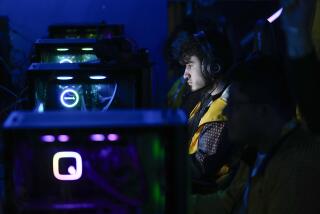For the cyberathlete, it’s all in the keystroke
- Share via
SEATTLE — The player’s village is a Doubletree Hotel near the airport. The competitors don’t have coaches, trainers or nutritionists, and most people over the age of 30 have never even heard of the games they play -- “StarCraft: Brood War,” “Counter-Strike,” and “Project Gotham Racing,” to name a few.
For the last few days, Qwest Field Event Center has been the center of the universe for serious video gamers. The World Cyber Games, described as the Olympics of video gaming, have taken over the nearly 200,000-square-foot exhibition hall, which normally hosts more staid events like home shows and business conferences.
The four-day event has brought together teams from 74 countries -- the Netherlands, South Korea, Colombia, Latvia, Uzbekistan, Greece and Saudi Arabia among them. The tournament ends this afternoon with presentations of gold, silver and bronze medals and a closing ceremony.
In all, the games have drawn about 700 participants, players for whom video gaming is no more a “game” than swimming is a dip in the pool for Mark Spitz.
“It’s one of the coolest things I’ve ever seen,” said spectator Brian Daniels, 16, of Seattle. He had just finished up a round of “Halo 3” at a demonstration kiosk. “The talent here is just incredible,” he said. “I’d love to reach this level.”
The Cyber Games’ event floor looks like a mash-up of a high-tech trade show, a boxing match, and a men’s dorm -- it’s a competition dominated by young adult males. The cavernous space is lighted by strobes and video screens; the noise of electronics, competing soundtracks and emcees fill the airspace.
On the main floor, two stage areas compete for attention. On an elevated stage, overshadowed by computer and video equipment, two players at a time compete. Spectators watch on three giants screens, which alternate between the play screen and close-ups of the gamers. Unlike physical athletes, their movements are barely perceptible. Think rapid eye movement. And keyboard strokes.
On the smaller stage, the action is displayed on video screens that encircle the stage. There’s a spectator bonus here: The seating is red and blue beanbag chairs.
Of the 22 players on Team USA, five are from New York, two from California and one from Washington state. The U.S. online qualifying rounds began in March, with 10,000 competitors. The final team represents the victors from a tournament in Orlando last month.
In the event’s seven-year history, this is the second time it has been held in the United States. Previous host cities include Seoul, San Francisco and, last year, Monza, Italy. All the competitors come hoping for medals as well as a share of the $448,000 in cash and prizes.
But the spectators -- most of whom also play -- come to see the best gamers in action. The women on the floor, for most part, seem to work for the vendors or are here to support a competing player.
“I just came to check it out -- I heard about it, didn’t really know what to expect,” said Nathan Martin, 24, of Seattle. Martin, a postal carrier, was watching a “StarCraft: Brood War” match between a Korean player and a Brazilian player. He describes himself as a casual gamer but says he couldn’t miss the event when it was happening in his own backyard,
“Last year, it was in Italy. Who knows if it will ever be back here again?” he said.
That sentiment was echoed by James Kerr, 41 an engineer from Salem, Ore., who drove up to Seattle with his sons, Brandon, 11 and Mathew, 13.
“We’re really here for him,” said Kerr, indicating Mathew. “It’s not something you get the chance to see every day.” The family was watching Team Estonia play “Counter-Strike” on banks of computer screens. The members, dressed in gray and white warmup suits, made no secret of their enthusiasm, cheering for each other and yelling passionately.
“It’s so fun to see these guys play,” said Mathew Kerr, who also plays “Counter-Strike.”
Natalie Schindler, 24, came with her boyfriend, Sascha Lupp, 22, a member of Team Germany.
Though Lupp lost his match on the first day of the event, Schindler said she was enjoying the spectacle and her first trip to the U.S. “I play the game,” she said, “but not like these guys.”
The games are run by International Cyber Marketing Inc., a South Korea-based company, which was founded in 2000 with the goal of creating world class e-sports events. Microsoft Corp. and Samsung Electronics Co., two of the bigger sponsors, have a strong vendor presence at the event, as does Circuit City Stores Inc.
Organizers estimate that last year, the event drew 40,000 spectators, and similar numbers are hoped for in Seattle.
Tony Menanza, 31, is a hot dog vendor who works across the street from the event center, between Seattle’s football and baseball stadiums. On Friday afternoon, the crowd was a little thin compared to professional sporting events.
“What do you expect?” he asked. “It’s not the Super Bowl. It’s a bunch of geeks.”
More to Read
Go beyond the scoreboard
Get the latest on L.A.'s teams in the daily Sports Report newsletter.
You may occasionally receive promotional content from the Los Angeles Times.






